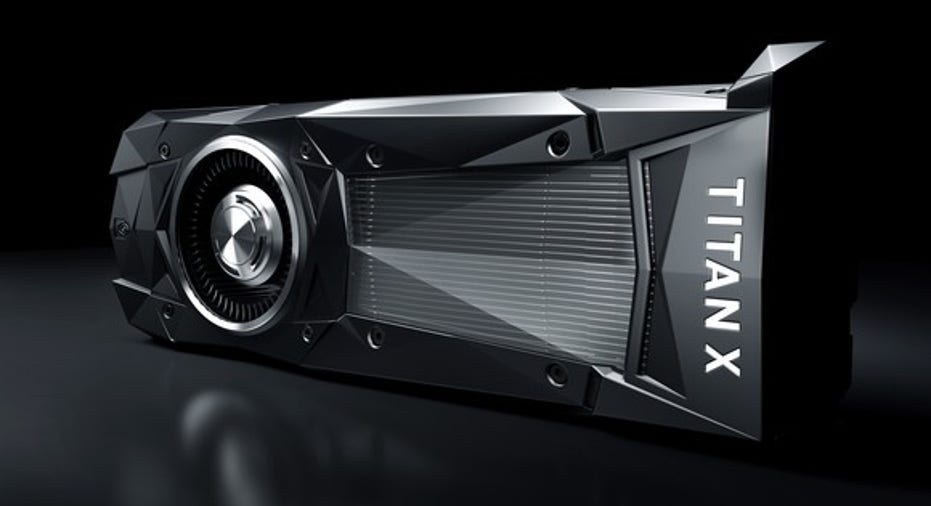NVIDIA Corporation Reportedly Planning to Launch GeForce GTX 1080 Ti Soon

On the Beyond3D forums, user Erinyes, who has provided accurate information about NVIDIA (NASDAQ: NVDA) graphics processors in the past, recently said the following in apost:
"A little birdie tells me that the GTX 1080 Ti launch is around the corner ... which makes sense since the holiday season is almost upon us."
Image source: NVIDIA.
Is it reasonable to expect NVIDIA to launch the GeForce GTX 1080 Ti so soon after the launch of its flagship GeForce GTX 1080 graphics processor back in May? Let's take a closer look.
More performance, more money
The GeForce GTX 1080 Ti is expected to be based on the same GP102 chip that powers NVIDIA's $1,200 Titan X graphics card, as well as the company's Quadro P6000 and Tesla P40 professional graphics and data-center acceleration products, respectively.
The current GeForce GTX 1080 is based on a lower-performance chip known as GP104.
NVIDIA and its board partners should be able to charge more for a potential GeForce GTX 1080 Ti than they currently can for GeForce GTX 1080 products -- higher performance usually translates into higher selling prices in a given generation. It only makes sense, then, for all the parties involved to want to get the GeForce GTX 1080 Ti to market as soon as practicable.
Such a rapid release cadence of high-end GeForce GTX gaming products isn't unheard of, either. Back in May 2013, NVIDIA released the GeForce GTX 780 and then released the more powerful, and more expensive, GeForce GTX 780 Ti in early November of that year.
Does that timing make sense?
Remember, if the GeForce GTX 1080 Ti is based on the GP102 chip, as mentioned, then the chips that would power the hypothetical GeForce GTX 1080 Ti have been "done" for quite some time. Not only that, but those chips have been shipping to many different customers, albeit not as GeForce GTX 1080 Ti products, for quite some time.
This means NVIDIA has had ample time to stockpile the chips that will power the GeForce GTX 1080 Ti products NVIDIA's board partners, too, have also likely have had plenty of times to build board and cooler designs around the chip as well.
It's also worth noting that the GP102 chip is an extremely large, very complex chip. Even though the manufacturing process upon which it's built --Taiwan Semiconductor Manufacturing Company's (NYSE: TSM) 16-nanometer -- should be relatively mature at this point, it's likely that a meaningful portion of the chips that come off the line aren't fully functional.
NVIDIA is selling the fully enabled parts into the professional visualization and data-center markets, and the Titan X is powered by a version of the chip with less than 7% of its functional units disabled.
But what about the remaining parts? What of the chips that come off the line requiring that more than 7% of their functional units be disabled, but even so would still be quite a bit faster than the current GeForce GTX 1080 Ti?
It makes perfect sense for NVIDIA to sell those parts as the GeForce GTX 1080 Ti, and the sooner the company can get them to market, the more they should be able to charge for that level of performance.
One more thing ...
NVIDIA should also consider releasing a fully enabled GP102-based part to gamers, perhaps as an updated Titan X. Or, since NVIDIA now appears to be interested in establishing the Titan brand as a distinct one from its GeForce GTX gaming line, perhaps offering it to gamers as a product that sits above the current Titan X in terms of both performance and pricing, perhaps at a $1,500 price point.
Such a part would be fairly niche, but given that there have been takers for the Titan X, I'd imagine that there'd be interest in an even more powerful, fully enabled Titan product.
A secret billion-dollar stock opportunity The world's biggest tech company forgot to show you something, but a few Wall Street analysts and the Fool didn't miss a beat: There's a small company that's powering their brand-new gadgets and the coming revolution in technology. And we think its stock price has nearly unlimited room to run for early in-the-know investors! To be one of them, just click here.
Ashraf Eassa has no position in any stocks mentioned. The Motley Fool owns shares of and recommends Nvidia. Try any of our Foolish newsletter services free for 30 days. We Fools may not all hold the same opinions, but we all believe that considering a diverse range of insights makes us better investors. The Motley Fool has a disclosure policy.



















